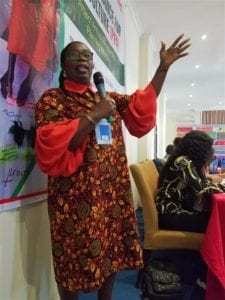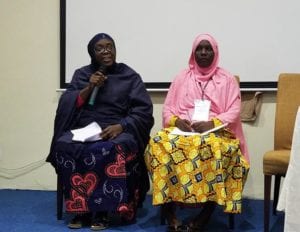We arrived in Addis Ababa on a cool Sunday morning, ready to begin a week of planning meetings for a flagship ActionAid project: Public Financing for Agriculture (PFA). It was my first international trip since I joined ActionAid USA in September. After years working on international climate policy, I was excited to see how project planning and implementation works in practice.
What is the PFA project?
The PFA project focuses on supporting women smallholder farmers to exert their rights to improve their livelihoods and on increasing public funding for the agriculture sector. Currently active in Nigeria and Tanzania, the project directly tests ActionAid’s theory of change: that eradicating poverty requires both shifting power to those living in poverty and connecting them with movements to demand respect for their rights. It is only when poor and excluded people are given space to take charge of their lives and take part in decision-making processes that we can really begin to address the root causes of poverty and injustice.
But why the focus on small farms? Because they are critical to food security and efforts to end poverty.
A 2018 study found that farms under 2 hectares produce 30-34% of the world’s food on 24% of total agricultural land. These farms produce more food (proportionally) and have greater crop diversity than larger farms. There are roughly 475 million small farms worldwide, and they support hundreds of millions of rural people, typically marginalized and living in extreme poverty. Women farmers in particular have less access to basic services and funding to make ends meet. As climate impacts increasingly threaten agricultural livelihoods, supporting women smallholder farmers becomes ever more important.

Constance Okeke is the PFA project manager.
What makes PFA special?
At the meetings in Addis, I got to hear from two farmers, Zainab Isah Arah from Nigeria and Sophia Abeid Juma from Tanzania. They spoke on behalf of their communities as participants in the PFA project. Each woman talked about how the project has given them opportunities to speak up in public and demand solutions that work for them. Women in their communities are engaging with government officials and international organizations to influence agriculture policy, and they are seeing tangible improvements at the local level. What’s more, decision-makers are realizing how much more effective their policies are when they listen to and respect the rights of people who are affected by those policies.

Zainab Isah Arah (left) and Sophia Abeid Juma (right)
As I listened to Zainab and Sophia, I was convinced that this model works! Changing the process of decision-making led to specific and positive impacts for women farmers living in poverty and hunger. Whether by providing grant funding in times of hardship or setting up seed banks or increasing market access, these communities are now better equipped to face the challenges ahead because they were part of deciding the solutions.
Women farmers in Nigeria and Tanzania are also starting to track domestic budgets to see how much money is flowing for agriculture. This means they can hold their governments accountable both to deliver on promises and for more investment in rural agricultural development.
Has the road been easy? Not at all. Is the work done? By no means. There is a lot more we can do to support women farmers and smallholders in general.
But I returned to D.C. inspired by what PFA has already delivered and excited about its potential to be a model for funding in agriculture more broadly. With increasing pressure on food production systems, deepening inequalities, and rising carbon emissions, the woman smallholder farmer is a critical part of restoring balance in a world spinning out of control.



